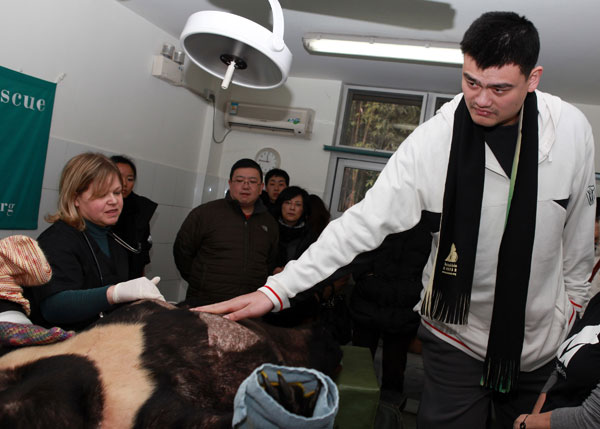Bear-bile farm draws rebukes for public visit proposal
|
Retired basketball superstar Yao Ming pets a bear at the Longqiao Bear Rescue Center in Southwest China's Sichuan province on Saturday morning. The center rescued the bear from a factory that extracts bile from live captive bears to make traditional Chinese medicines. Provided to China Daily |
BEIJING - A Chinese pharmaceutical company invited the public to visit its bear-bile farms to clear up concerns about maltreatment, but soon found that its website had been hacked.
Its move also drew questions and criticism from animal protection organizations.
Fujian Guizhentang Pharmaceuticals Co Ltd, which extracts bear bile to make traditional Chinese medicines, had been planning a stock market listing.
The plan was strongly opposed by animal protection organizations and many individuals who accused it of using cruelty to extract bile from bears.
The company claimed that the animal rights groups had no idea of current extraction methods, which were "easy and not hurtful", and it announced plans to open its farm to visits by media and experts on Wednesday and Friday.
In a public invitation posted on its website, the company said it expected to receive 100 people - media on Wednesday and experts on Friday - and let them see the living conditions of its captive bears and the process of extraction.
But within an hour after the invitation was posted on Saturday night, the website was hacked.
"It was repaired in the morning and we've reopened registration for everybody interested in this issue. The list of those who received an invitation is expected to be posted on the website on Sunday night," a female employee who said she was in charge of collecting information about visits told China Daily on Sunday.
But some celebrities and experts said that they had doubts about the public visits.
Zhang Yue, a TV hostess and founder of the Beijing Loving Animals Foundation, also known as Ta Foundation, said that although the visits represented progress by the company, she and the organization rejected such 'staged' events.
"We all know that the company could have time to prepare for the visits and may give the public a false picture," she said. "What we want is the truth."
Media and experts should not visit on two separate days, because it wouldn't help reporters learn the truth, she said.
Officials from the World Society for the Protection of Animals, headquartered in London, also said that the visits wouldn't reveal the truth.
Sun Quanhui, a senior official of the society, said: "The visits won't help people get a true and full picture about the captive bears These short visits would only provide a superficial view. We cannot guarantee what we will see is true."
He suggested that instead of a couple of visits of this nature, there should be a series of visits based on a systematic plan to evaluate the bears' situation and the method of extracting bile.
Not only domestic experts should have a chance to visit, he added. Involving international experts would make the results more credible.
The matter also attracted online attention. A netizen named 8arbara posted on Sina weibo, a popular micro-blogging website: "It's too cruel to witness the extraction of bile from a pipe plugged into a bear's body.
"I don't believe we'd see the real situation in just those two days," she said.
Guizhentang, founded in 2000, keeps 470 bears and may expand the size of its farm after raising funds through its initial public offering (IPO).
But its attempt to get listed has aroused much controversy. More than 80 public figures have signed a petition opposing its IPO application.
"We'll make more effort to stop its application (for a listing) and force the company to stop maltreating those bears at last," Zhang said.



















